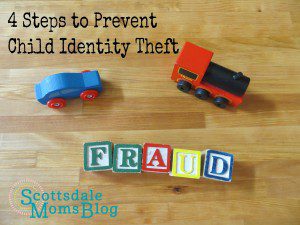 It’s all over the news: data breaches at Home Depot, Target, and Anthem; thieves filing fraudulent income tax returns to steal refunds. Identity theft is a growing problem in our information age. You take measures to guard your own personal and financial data, but have you thought about protecting your kids?
It’s all over the news: data breaches at Home Depot, Target, and Anthem; thieves filing fraudulent income tax returns to steal refunds. Identity theft is a growing problem in our information age. You take measures to guard your own personal and financial data, but have you thought about protecting your kids?
In recent years, children and adolescents are the fastest growing sector of identity fraud victims. A 2011 study of more than 42,000 minors found that around 10% of children are victims of identity theft before they turn 18. While parents may have a system of alerts and credit report checks set up to protect their own accounts and data, kids are easier targets. I’m guessing your 5 year old isn’t checking his credit report annually, right? Identity theft on a child can go undiscovered for years. You may not become aware until your child is turned down for a student loan or a car loan due to a horrible credit history.
What can you do to protect your child from credit fraud? Here are 4 steps to prevent child identity theft:
1. Know the warning signs
Signs that your child’s credit history has been compromised include:
- your child is denied a bank account or drivers license
- credit card and loan offers addressed to your child
- collection calls or bills addressed to your child
- being turned down for government benefits because the Social Security number is already in use
- a notice from the IRS that your child owes income taxes or was claimed as a dependent on another return
Don’t immediately panic if you receive a credit card offer in your child’s name. Financial companies do occasionally, mistakenly send credit card offers to a minor. But be on alert if you suddenly start receiving a lot of mail that would typically be for adults.
2. Check your child’s credit report
It isn’t as easy to check your kid’s credit report as it is to check your own. You’ll have to mail or fax in documentation proving your are the parent or guardian. Each of the three major credit bureaus have their own process for checking a minor’s credit report.
If you request a credit report for your child and none is available, that is a good thing! No credit report means your child’s social security number and other information haven’t been used. However, even if your child doesn’t have a record with one credit bureau, they may have a record with one or both of the other bureaus. Not all creditors report to all three agencies. If you do suspect identity theft, you’ll want to check all three.
How often should you check? You probably won’t want to go through the hassle of checking all three bureaus annually. But if you suspect your child has been a victim, you should check as soon as possible. It’s also a good idea to check your child’s credit report close to his or her 16th birthday. If there has been any fraud, you will have time to correct it before your child applies for a job, a car or student loan, or needs to rent an apartment.
3. Should you freeze your child’s credit?
A credit freeze keeps your credit report from going out to any potential lenders unless you take steps to temporarily lift the freeze prior to applying for credit. Victims of identity theft often freeze their credit reports to avoid future problems. You can freeze your child’s credit report IF they already have one. A few states have laws requiring the credit bureaus to create an empty credit file for your child just so you can freeze it, but Arizona does not. Again, you’ll have to order the credit freeze with all three credit bureaus separately.
Unless your child has already been a victim of identity theft you may not want to freeze his or her credit report. Experian says simply ensuring your child doesn’t have a credit report may offer better protection. If someone tries to take out a loan in your child’s name, the lender will be notified that the person has no credit report and the individual is a minor. Then the lender can notify authorities and hopefully catch the thief.
4. Be aware
As a parent, the best thing you can do to protect your child is to practice awareness.
- Don’t give out your child’s social security number – even to family members. If a business asks for your child’s social security number, always ask them why they need it. Ask if you can provide an alternate identifier – perhaps just the last four digits of their social security number.
- Shred all documents, even school records and seemingly benign information with your child’s name on it. Thieves can use that data to gain access to more information.
- Make sure that any activity your child participates in uses the information properly and handles it with care. If a sports team requires a birth certificate for sign up, ask how the information is stored and what safeguards are in place during storage.
- Educate your children. Teach them to keep personal information private when they are online. Social networking sites can be a gold mine for identity thieves and children can innocently provide information without thinking.
- Consider pulling your child’s credit report every few years just to be sure nothing is amiss, and report any discrepancies immediately. You may also request an annual Social Security earnings record. This will alert you if someone is used your child’s social security information to obtain a job. To request a report, call 1-800-772-1213 or visit https://www.ssa.gov/online/ssa-7004.html.
If you discover your child has been a victim of identity theft, file a police report and get a copy of the report, not just an investigation number. Contact each of the three credit reporting bureaus to notify them of the fraud, and follow their advice for next steps.


















